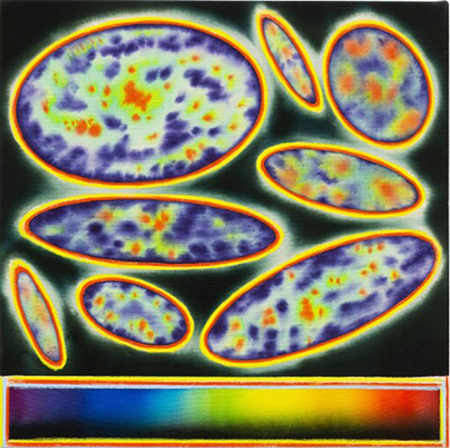
Continuing through November 13, 2021
For his first solo exhibition in Los Angeles, Brooklyn-based Michael Childress presents eight small square paintings that really light up a room. Visually charged with chromatic progressions that cross the entire color spectrum, Childress’ paintings emit an aesthetic heat that leaves one feeling inspired or exhilarated.
From a technical standpoint, such effects are achieved by painting with acrylic on unprimed canvas, so that the paint saturates the material to produce lush surfaces. Additionally, many of the images, which resemble waves, orbs, planets, galaxies, and other elements commonly found on diagrammatic charts used in the study of physics or astronomy, are circumscribed by glowing auras that activate and intensify what might otherwise be perceived as dry, scientific data. Childress’ science, of course, is purely intuitive, as he is more interested in postulating visual ideas about what might be, rather than about simply what is.
Entitled “Pictures of the Floating World,” a reference inspired by the colorful skies of Japanese Ukiyo-e prints, the paintings on view are a part of a larger body of work that Childress calls “Equivalents.” Early twentieth century photographer Alfred Stieglitz used this term to describe his photographic abstractions of clouds. Like Stieglitz, who considered his cloud images to be equivalents of his elated mental state when he took the pictures, Childress feels a sense of awe towards the unknown territories that exist beyond the clouds. In each painting, he fills a small lateral section at the bottom with representations of the terrestrial, but devotes the vast majority of the pictorial space to visualizing imagined celestial zones.
Two paintings that best fulfill the artist’s stated intent of translating Ukiyo-e prints into a contemporary idiom are “Other Worlds / What Can’t Be Seen” and “The Shadow of the Pleasure Dome.” In the former, the upper section shows eight psychedelically illuminated spheres spinning about at different angles in a black atmosphere. Each contains a colorful map of a different universe, but all are connected to one another by their auras, which overlap and merge as if through magnetic attraction. In the latter, the pleasure dome is an abstraction made up of overlapping orbs filled with vivid polychromatic color splashes. Its jubilant tone brings to mind the hedonistic excesses of the brothels, theaters and festive activities that form the narratives of Ukiyo-e prints.
Within the overall series, Childress establishes a variety of moods. In “Due Dischi Volanti” (Italian for “Two Flying Saucers”), two space vehicles that dominate the composition lend a touch of whimsy, as the structure of each suggests the face of an extraterrestrial being staring at us with bulbous eyes. “Fluid Interface” and “Transcendental Bijection” are high energy compositions in which circles and ovoid rings respectively are repeated multiple times and painted in palettes so bright that the images feel as though they are controlled by electricity. By contrast, the sublime sherbet-toned “Soft Beam” is more meditative. Although a bright circular light beam is positioned at center like an icon and directed straight at us, its high luminosity is countered somewhat by the geometric structure of three rectangular bars that envelop it.
In a time when scientific inquiry is continually being disregarded, it is a welcome respite from that nonsense to encounter the work of an artist who not only believes in science, but celebrates it with joy and wonder.
